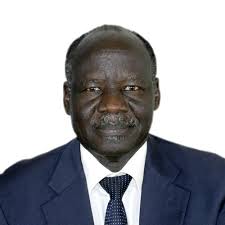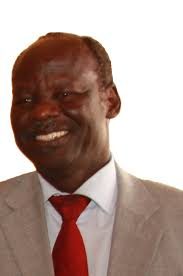THE CHARTER OF THE SOUTH SUDAN OPPOSITION ALLIANCE (SSOA)
Preamble
Cognizant of the fact that the unity of South Sudanese Opposition Political Movements, Parties and Fronts is paramount to bringing about the most needed peace to South Sudan speedily;
Emphasizing the paramountcy of unifying our ranks and working closely and collectively together to present a unified front to resolve the crisis in the Republic of South Sudan and return the country to peace, law and order;
Aware of the need for unity of purpose, cooperation and collaborations, we, the leaders and representatives of South Sudanese Opposition Political Movements, Parties and Fronts mentioned in the annex, after full and frank deliberations are convinced that we share:
• An urgent need to synergise and consolidate the strength of South Sudanese Opposition Political Movements, Parties and Fronts;
• A recognition that a unified front from the like-minded opposition is a prerequisite to end the war in the Republic of South Sudan; stop the suffering of the people, and bring meaningful governance and political changes to the country;
• A commitment to put the interests of South Sudanese and our country above all personal and political interests and considerations;
• A desire to build a South Sudan that is a home to all that live in it and that is accommodating and responsive to the needs and views of all South Sudanese from all ethnicities;
We have, therefore, agreed and pledged to work together and to abide by this Charter and the principles set herein and to attain the objectives contained hereto as follows:
Article 1 Establishment
1) The South Sudan Opposition Alliance “SSOA” is hereby established in accordance with the provisions of this Charter.
2) The objectives, structure, mandate and functions of SSOA shall be defined as herein the Charter
Article 2 Name
The name of the Alliance shall be the South Sudan Opposition Alliance, hereinafter referred to as “SSOA”
Article 3 Objectives of the SSOA
The SSOA is established to:
1) Liberate South Sudan from the grip of ethnic chauvinism, despotic oppression and institutionalized corruption.
2) Work together in close cooperation to achieve a just and sustainable peace in South Sudan.
3) Work co-operatively to change the system, structure and nature of governance in the Republic of South Sudan for the better.
4) Restore legitimacy, stability, reliability, accountability and credibility in governance of the country.
5) Design and implement a programme for the economic, social, cultural and political rebirth of South Sudan.
6) Foster and nurture a progressive and democratic culture and to restore the rule of law and order.
7) Achieve a strong federal system of government in South Sudan.
Article 4 Common position on ARCSS
1) We hold the view that ARCSS was a good attempt that did not go far enough. At least, it provided for some elements, which, if implemented in good faith, could have assisted in a modest way to help South Sudan get back on track. Unfortunately, the regime was deceitful and as such, from the onset, preoccupied itself with the destruction of, and with how to trigger the collapse of ARCSS.
2) However, we also believe that ARCSS was fundamentally flawed. This is so partly because:
a) It preoccupied itself with conflict management rather than the conflict resolution and transformation, its main concern being the realignment of balance of power within the different mutations of the SPLM/A.
b) It entrusted those who destroyed the country with the responsibility of rebuilding it; and those who committed heinous crimes with the power of redress,
c) It treated the negotiating parties unequally, rewarded bad behaviours and honoured violence thus wittingly or unwittingly, sent the message that having capacity for violence and the willingness to use it pays,
d) It put the political survival of individuals above national survival and cohesion and, in the process, significantly eroded the disposition to cooperate.
e) ARCSS was an exclusive Agreement between the warring parties of the SPLM as a result it excluded the majority voices of non-armed people of South Sudan.
f) The ARCSS did not take into consideration the factual historical reality of South Sudan.
3) ARCSS was a conflict management tool rather than a conflict resolution framework. Therefore, the replication or adaptation of the ARCSS addressing these flaws is a futile exercise, as the result of the revitalised ARCSS will be the same as that of the collapsed one.
4) We are resolute that: ARCSS should be significantly reviewed, revised and amended to ensure that it:
a) Addresses the root causes of the conflict, which includes ethnic hegemony, the use of the security sector to intervene in political discourse, to intimidate, to protect and promote ethnic domination and centralisation of authority, political and economic powers,
b) Creates a conducive level of negotiating format where the parties can expect that their views, grievances and proposals will be considered on their merit rather than as a mere function of military might,
c) Establishes an oversight mechanism that interprets the provisions of the agreement, apportions blame, recommends binding remedial actions and discharges punitive measures.
d) The revitalisation process or any peace agreement should be inclusive and accept new political developments and provide an opportunity for all South Sudan to discuss and affirm a social contract for the country.
Article 5 Statement of commitment
We, the Members of the SSOA commit to:
1) Work together on agreed common matters of mutual interests. We are aware that whilst many of our strategies and policies are compatible, we acknowledge and accept that as distinct movements, parties and fronts, there are bound to be specific differences in some approaches, policies and strategies.
2) Respect and accept the right of each member of the SSOA to hold and express alternative views on areas where there is no common position
while acknowledging that such differences shall be communicated in collegial and respectful civil manner so as not to detract from the purpose of the SSOA.
3) Work together in good faith and mutual trust and to relate towards each other with integrity and openness.
4) A policy of ‘no surprises’, meaning that we will give each other prior notice and details of a major step or announcement even when the subject matter might not be included in the SSOA’s common position.
5) The integrity and unity in diversity as a national heritage of South Sudan while upholding the inherent and inalienable right of the different regions, peoples and nationalities to self-rule.
6) Cooperate rather than confront and engage in destructive competition, and to cease and desist from hostilities and negative propaganda towards the members of SSOA.
7) Recognize that although we are distinct Movements, Parties or Fronts, that being like-minded and by working together, the possibility of losing our individual identities over time by merging into one integral organization is real.
Article 6 Statement of principles
The following principles are the basis for the establishment of and, interaction and cooperation between and among members of the SSOA:
1) Common vision, values and principles: The SSOA is based on a shared vision on how to resolve the current conflict and how to lay the foundation for a viable, legitimate, stable and democratic state in South Sudan. The members of the SSOA recognise the strength of unity in diversity; nonetheless, for SSOA to be viable, sustainable and mutually beneficial, there must exist sufficient shared understanding of values and principles that sustain this partnership. At the bare minimum, members undertake to abide by and uphold the commitments in this Charter.
2) Complementarity of purpose and value-addition: The goal of the SSOA is to work for a South Sudan that is peaceful, democratic and strongly federal, prosperous, fairer and a just place for everyone that lives in it. This SSOA brings together the unique and diverse knowledge, qualities, expertise, and resources that each member brings to the table. The SSOA will work hard to draw upon, amplify and complement as well as channel such combined efforts to bring about durable peace in South Sudan.
3) Clear roles and responsibility: The leadership of the SSOA will openly discuss, transparently negotiate and agree upon a set of clearly spelt out decision-making processes, processes of consultation, lines of communication and accountability.
4) Commitment to mutual accountability and transparency: The SSOA acknowledges that it is a trustee and stands in a fiduciary relation with the suffering and downtrodden people of South Sudan. The SSOA will strive to uphold the highest level of transparency and accountability to the people of South Sudan and towards its members.
5) Commitment to respecting autonomy: The SSOA is predicated on mutual respect for institutional integrity and organisational autonomy. The SSOA respects divergent viewpoints and styles of each member without minimising the role of the SSOA in cross-influencing each other for greater reach and impact.
6) Participation, consensus and single undertaking: The SSOA acknowledges the rights of each member to seek and receive information and to take part in decision-making. On areas not commonly agreed, the SSOA will work based on the principle that virtually every item of the consultation and negotiation is part of a whole and indivisible package and cannot be agreed upon separately.
7) Sincere cooperation: Every member of the SSOA shall, in full mutual respect, assist each other in carrying out tasks which flow from this Charter.
Article 7 Membership
1) Membership of the SSOA is open to any group or persons of standing, which or who are opposed to the regime, abhors the regime’s destructive policies, programs and practices, which or who has accepted to adhere to the objectives, policies and programs of the SSOA.
2) Membership shall be approved by the Leadership Council of the SSOA.
3) A member shall cease to be a member if:
a) A resolution to that effect is passed by the member’s leadership and delivered to the Secretariat of the SSOA.
b) In the opinion of the SSOA Leadership Council, the member has not complied with the commitments or principles of the SSOA.
c) The member has accepted or promoted through its leadership, activities of external actors whose aims and objectives are contrary to those of the SSOA.
4) The SSOA shall commit itself to do everything possible to accommodate other opposition groups based on the SSOA’s values and principles and in accordance with this Charter, in an endeavour to strengthen the unity of the opposition.
5) Members who are individual persons shall be members without voting rights.
Article 8 Organs of the SSOA
The SSOA shall have the following organs: A Leadership Council, the Military Command, and a Secretariat.
Article 9 The Leadership Council
1) The Leadership Council shall be the highest authority of the SSOA and shall determine the SSOA’s policies.
2) The Leadership Council shall consist of the Leader of each member of the SSOA.
3) The Leadership Council may appoint an individual to be a member of the Leadership Council without voting rights.
Article 10 Function of the Leadership Council
Without prejudice to the generality of article 9 (1) above, the Leadership Council shall have the following specific powers, duties and obligations:
1) Propose and approve all policy positions of the SSOA relating to the objectives of the SSOA and this Charter.
2) Approve the SSOA’s representatives to engage with key stakeholders, taking into consideration equitable representation of the members and gender.
3) Ratify or approve the ratification of the rules and regulations of the SSOA.
4) Approve the audited accounts of the SSOA.
5) Approve the appointment of auditors and fix their remuneration.
6) Approve the core minimum program of the SSOA.
7) Elect the Chairperson, General Secretary, Military Coordinator and other office bearers of SSOA as specified in the Regulations.
8) Approve the establishment of committees, as it deems necessary from time to time, or specialised tasks and determine their terms of reference.
9) Receive reports and approve recommendations from the Joint Military Command, the Secretariat, the various committees and individuals.
Article 11 The Joint Military Command
1) Following the establishment of the Leadership Council, the Leadership shall constitute a Joint Military Command.
2) The Joint Military Command shall consist of the Chief of Staff of the military wings of those members who have such a wing.
3) The Joint Military Command shall be subordinate to the Leadership Council and chaired by the Military Coordinator.
Article 12 Functions of the Joint Military Council
1) To ensure coordination and cooperation at strategic and operational levels where necessary.
2) To act in a military advisory capacity to the Leadership Council.
3) To carry out any other functions as may be assigned to it from time to time by the Leadership Council.
Article 13 The Secretariat
1) Upon the establishment of the Leadership Council, it shall constitute a Secretariat to manage the day-to-day activities of the SSOA and actively facilitate the participation of members in the activities of the SSOA.
2) The Secretariat is accountable to the members of the SSOA through the Leadership Council.
3) The Leadership Council shall elect the Secretary General, as the Chief Administrative Officer of the SSOA from among the members of the Alliance.
4) Each member shall appoint one person to constitute the Secretariat. This number may be reviewed by the Leadership Council from time to time.
Article 14 The functions of the Secretariat
1) Assist or facilitate the members in their individual and collective capacity to formulate policy on all matters agreed upon by the SSOA.
2) Serve as the ‘brain-trust’ of the SSOA through collecting strategic information, classifying, analysing and supplying it promptly when and where most needed.
3) Serve as the main coordinating agency for members of the SSOA.
4) Make policy proposals to the Leadership Council.
5) Serve as the spokesperson of the SSOA under the direction of the Leadership Council.
6) Facilitate meetings, schedules and agendas of the Leadership Council.
Article 15 Resource mobilisation and management
1) The SSOA shall mobilise its resources from partners, goodwill donation from friends and well-wishers to facilitate the work of the SSOA.
2) The Leadership Council shall agree on a joint mechanism to equitably distribute resources received in the name of the SSOA.
3) The Leadership Council shall report on a regular basis to members on resources received against expenditures.
Article 16 Decision making
The SSOA’s decision making shall be by unanimity failing which a decision shall be taken by consensus.
Article 17 Dispute resolution
1) Any dispute or difference arising between members about the interpretation, application and implementation of this Charter shall be settled by mutual consent between or among the members concerned, including through negotiations, mediation, conciliation or other peaceful means;
Article 18
Entry into force
This Charter shall enter into force thirty (30) days after the Charter has been endorsed by the Leaders of the members of SSOA at a Leadership Summit.
Article 19 Withdrawal
1) At any time after three months from the date on which this Charter enters into force, a member may withdraw from the SSOA by giving written notification to the General Secretary.
2) Withdrawal shall be effective one month after receipt of such notice.
3) Withdrawal shall not exempt the withdrawing member from fulfilling any obligations it might have incurred under this Charter.
Article 20 Amendment and Revision
1) Any member may submit proposals for the amendment or revision of this Charter;
2) Proposals for amendment or revision shall be submitted to the Secretary who shall transmit it to the Leadership Council within a week.
3) The proposal shall be considered effective once ratified by the leadership of each member.
Endorsed by the Leaders at the Leadership Council, held in Addis Ababa, Ethiopia on the 16th February 2018.
IN WITNESS WHEREOF the undersigned, being duly authorized to that effect, has signed this Charter.
Signed this 16 day of February 2018 by:
Hon. Gabriel Changson Chang FDP/SSAF Chairman
Gen. Thomas C. Swaka NAS Chairman
Dr. Lam Akol NDM Chairman
Dr. Hakim Dario PDM Chairman
Gen. Bapiny Monytuil SSLM/A Chairman
Gov. Bangasi Joseph Bakosoro SSNMC Chairman
Dr. Costello Garang Ring SSPM Chairman
Gen. Peter Gatdet Yak SSUM/A Chairman
Dr. Gatwech K. Thich UDRA Chairman
For contact and further information:
Dr. Kwaje Lasu
Interim Spokesperson for the SSOA Tel: +13365755965
Email: jointoppositionpressrelease@gmail.com
Editor’s Note: The views expressed in the “Documents Page” are solely the opinions of the writers. The veracity of any claims made are the responsibility of the author’s and are not necessarily endorsed by The Malakal Post. The Malakal Post, reserves the right to edit articles before publication. If you would like to submit an opinion article or analysis, please email your article at: info@malakalpost.com















